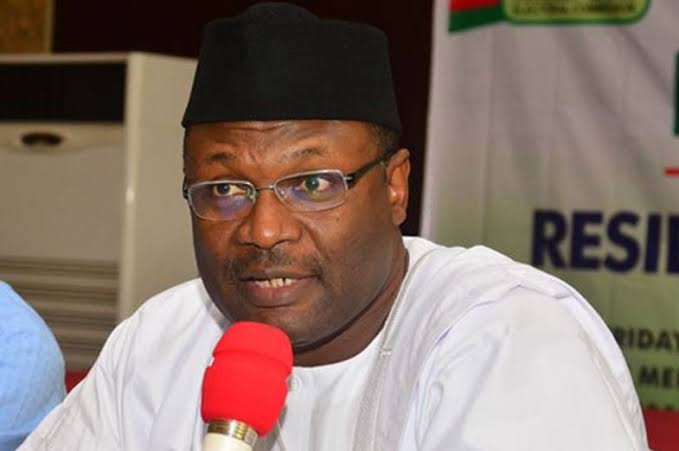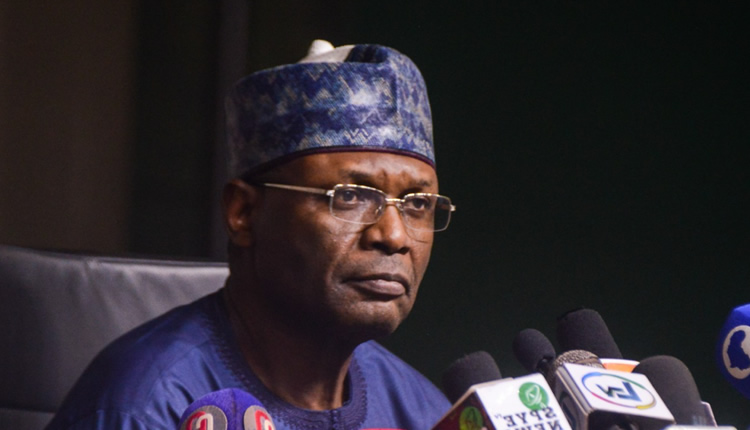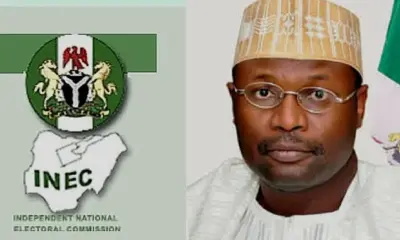News
Road to 2023: 95 million Nigerians will vote in 176, 846 polling units- INEC

No fewer than 95 million Nigerians in 176, 846 polling units are expected to participate in the 2023 general elections, says Chairman, Independent National Electoral Commission, INEC, Mahmood Yakubu.
Yakubu was speaking at an event organised by the National Endowment for Democracy, NED and the International Foundation for Electoral Systems, IFE, at the NED Headquarters, Washington DC, United States of America,

Yakubu said the 2023 General Election was the seventh successive general election since the restoration of democracy in Nigeria 23 years ago in 1999 and the longest unbroken period of democracy and democratic elections since independence from British colonial rule 62 years ago in 1960.
According to him, the election is significant because the incumbent President is not eligible to run, this being his second and final term.
Also the number of Nigerians going to the polls is larger 14 West African Countries put together, whose number is 75 million.
He said, “There are 18 political parties in the race to produce the next President to be elected by 95 million voters. We had over 84 million registered voters in 2019. But with last Continuous Registration of Voters (CVR), we are going to add at least 10 million Nigerians and that will take the Register of Voters to 95 million.
“I say this and I won’t be tired of saying it to an audience like this: In West Africa, there are 15 countries including Nigeria. But the total number of registered voters in the 14 countries combined is 73 million. In Nigeria, it’s going to be 95 million. So, there will be 22 million more voters in Nigeria than the whole of West Africa put together. Each time Nigerian goes to the polls, it’s like the whole of West Africa voting. And these 95 million citizens will vote in 176, 846 polling units.
“The timetable released by the Commission in February this year identified 14 critical activities to be accomplished by the Commission leading to the election day. So far, nine out the 14 activities have been successfully accomplished and campaign by political parties and candidates has commenced nationwide.
“We learnt a lot of lessons from the general election conducted in 2015 and 2019 as well as the 103 off cycle elections and bye-elections since the 2019 general elections. We have introduced innovations to increase transparency and ensure credibility of the electoral process. The new Electoral Act with its many progressive provisions has provided legal backing to the innovations.”
In addition, “For the first time in the history of voter registration in Nigeria, citizens were given the opportunity to commence their registration online, book an appointment at their convenience to complete the registration physically at designated centres by going there to capture their facial and fingerprint biometrics. Those who don’t have access to the internet have the option of completing their registration physically at the designated centres. The online option was introduced on the recommendation of many stakeholders, particularly young persons. Some of them approached the Commission and said that “if you can introduce something online so that we don’t have to go to the physical centres, it will be very helpful.”
“It has also helped us to reduce the level of litigation arising particularly from the conduct of political parties because now it’s an interaction between the party agents and the machines and anytime you logged in and out, there is a time stamp, so you can’t argue. If you argue, we’ll produce the evidence of what happened. And at 6pm on a fixed date, the portal automatically shuts down. If any party has any problem, it’s not the Commission.
“We have completed the cleaning up of the data using the Automated Biometric Identification System (ABIS) that combines the fingerprint and the facial authentication of registered voters. Those who registered twice, those who are underage or those who had no reason to register as provided by law have been weeded out. The exercise was completed a few days ago. We have not even shared the information with Nigerians, but we have 2.7 million invalid registrants and they have been weeded out. We’ll continue to take steps necessary to protect the integrity of the Register of Voters because it is fundamental to the conduct of elections. There can’t be credible elections without a credible register of voters.
“Nigerians have been asking the Commission, when you finish registration and clean-up of the data, what about our Permanent Voters’ Cards (PVC)? This will be available for new registrants by next month – November. We are looking at early to the middle of the month to make the cards available. We have already printed over 50 percent of the cards but we haven’t delivered them to the states yet. As we clean the data, we also print the cards. Nigerians who have registered should be rest assured that they will have their cards ahead of the general election. We also need to do so in good time because the law now requires us to publish the number of cards collected per polling unit.”
Furthermore that “Another innovation that we introduced is the INEC Result Viewing (IReV) portal. We are perhaps one of the few countries in the world that transmits polling unit level results in real time on election day. Proudly, I can say we are the first to introduce it in Africa. I was in Nairobi in August and they did so, but I told my friend, (Wafula) Chebukati, (Chairperson of the Independent Electoral and Boundaries Commission of Kenya) that he must have borrowed the idea from Nigeria. In 2017, they tried to transmit raw data. But in Nigeria, we say don’t transmit raw data, but transmit scanned images of the polling unit level results which is safer and less susceptible to hacking than transmitting raw figures.
“On inclusivity, we have created a new Department of Gender and Inclusivity in the Commission and within the limits of available resources, we have provided Assistive Devices for Persons with Disabilities, such as Braille Ballot Guide and Magnifying Glasses for the vision impaired and those living with Albinism. This was specifically recommended by the Albino Foundation. We work with the Albino Foundation to provide Magnifying Glasses and we work with Inclusive Friends to provide the Braille Jacket, which has the acronyms of political parties in Braille. The person who needs it inserts the ballot paper in the jacket and such person can vote unassisted. But for those who don’t read braille, they can still bring trusted relations on election day.
We have posters for individuals who are hard of hearing because they also complained that “INEC provided Braille Jackets and Magnifying Glasses, what about us? We can see, but we can’t hear, what do we do?” So, the Commission created posters for them which they can read on election day and we’ll continue to give more to ensure inclusivity.
“Are there concerns about the 2023 general election? I’ll be the last to say there are no concerns. The first concern is the perennial issue of insecurity in different parts of the country, compounded by the traditional issues of thuggery during elections organized by some of the political actors. I say it is a perennial issue because at the end of the day, it is nothing new. However, the dimension of the insecurity is concerning in the sense that in the past, it was localized or confined to a particular part of the country, the northeast. But now it is more widespread and we are keeping our eyes particularly on the northwest and the southeastern parts of the country.
“Elections are conducted by human beings. We worry about the security of our officials, voters and the materials to be deployed. Without them, we cannot conduct elections. We have spoken to the security agencies, they have assured us that the situation will improve before the elections. So, fingers crossed. Those who are supposed to secure the environment have assured us that they will secure the environment for us to conduct elections. Our responsibility is to conduct elections.
“The social media has been a force for good. The Commission does not support censorship. We believe that the antidote to fake news is greater transparency and openness and we have been demonstrating greater transparency and openness.
“The social media plays a very important role in voter education and deepening democracy but it also has the potential of skewing the narrative with the wrong information that impugns the integrity of officials or seek to delegitimize the Commission and the process either before, during or after the elections. Publication of fake election results is a potential trigger for violence. What we have done is to continue to deepen our cooperation and relationship particularly with the organized social media. In Nigeria, there is a forum called the Guild of Corporate Online Publishers (GOCOP). They have over 80 members and only last week, I was in Lagos and engaged with them. We’ll continue to engage with them. But the problem is not always with the organised online platforms, but with the lone rangers or groups using platforms that complicate matters for everyone.”

























